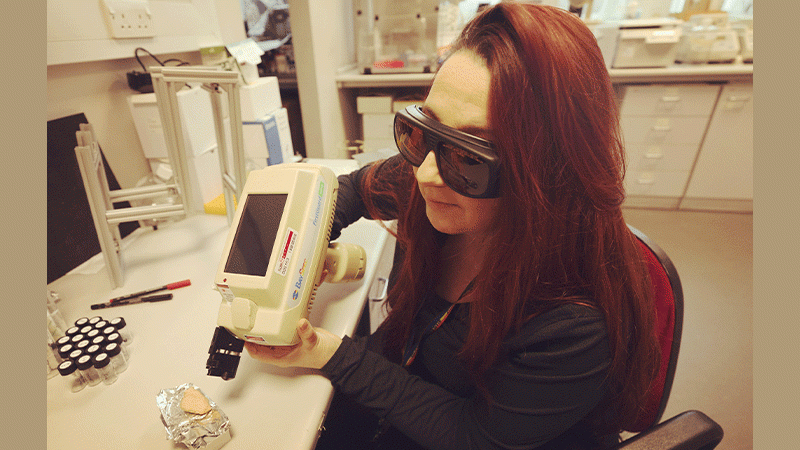Astrobiology PhD student Marina Barcenilla and Professor Lewis Dartnell, Professor of Science Communication at the University of Westminster, both contributed to a new exhibition at the Natural History Museum, including showcasing scents that replicate what outer space would smell like.

The exhibition, named Space: Could life exist beyond Earth? includes Marina’s work on how smell can be used to reveal what other worlds could be like and enhance public understanding of astrobiology through multisensory science engagement.
To develop the exhibition Professor Dartnell worked as a formal consultant to the Natural History Museum team. He advised on the most cutting-edge research to include, offered guidance on how the interactive elements could most effectively engage visitors and provided feedback on exhibit design proposals. His input helped to ensure that the exhibition not only communicated scientific accuracy but also maximised public engagement.
Alongside her work on the exhibition, Marina’s research spans the search for life beyond Earth and the innovative use of scent in science communication. Her PhD focuses on detecting biosignatures, which are characteristics, molecules or substances that may provide scientific evidence of past or present life on a planet, on Mars, using methods that analyse how light interacts with rocks to reveal what they are made of.
As a professional perfumer and founder of the science-outreach project AromAtom, which she founded during her undergraduate studies in 2017, she blends fragrance chemistry with astrochemistry to recreate the smells of outer space, making complex scientific ideas more accessible and memorable. Marina is especially passionate about inclusive science engagement, creating sensory experiences that invite everyone, from students to scientists, to explore the cosmos in new and creative ways.
Marina said: “Combining space science with perfumery is a great way to bring the cosmos to life. By translating the molecular signatures of planets and asteroids into scent, visitors can experience the cosmos in a deeply human and emotional way. Smell is an emotional sense; it bypasses logic and takes us straight to memory, wonder and curiosity. I'm thrilled to help people connect with the question of life beyond Earth, not just through facts, but through their senses.”
Professor Dartnell added: “Marina is a fantastic PhD student thoroughly committed to her research project and has been producing some really interesting results to help support the search for signs of bacterial life on Mars. She is also a phenomenal perfumer, running her own business, and it is wonderful to see how she has combined these two fields - planetary science and perfumery - to create some authentic scents of what different locations in space might actually smell like!”
Marina’s work directly contributes to the United Nations Sustainable Development Goal (SDG) 4: Quality Education. Since 2019, the University of Westminster has used the SDGs holistically to frame strategic decisions to help students and colleagues fulfil their potential and contribute to a more sustainable, equitable and healthier society.
The exhibition began on 16 May and will run until 22 February 2026.
Learn more about Biological and Biomedical Sciences at the University of Westminster.









